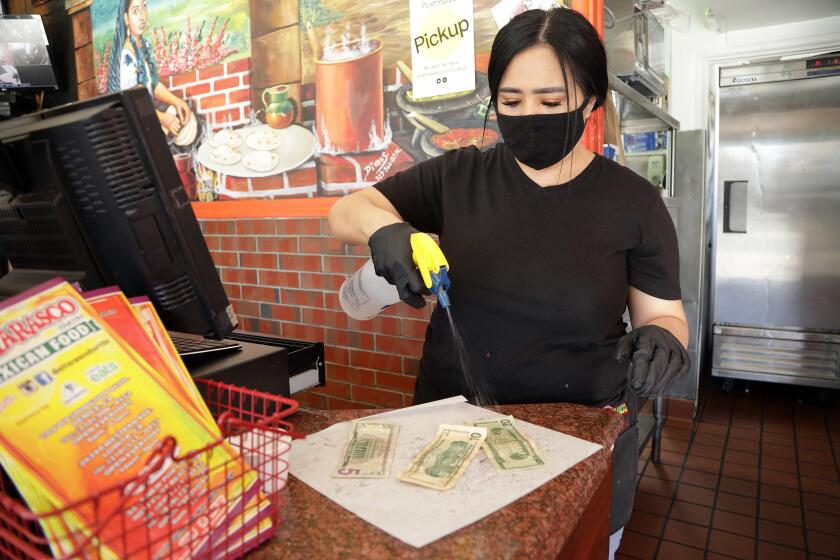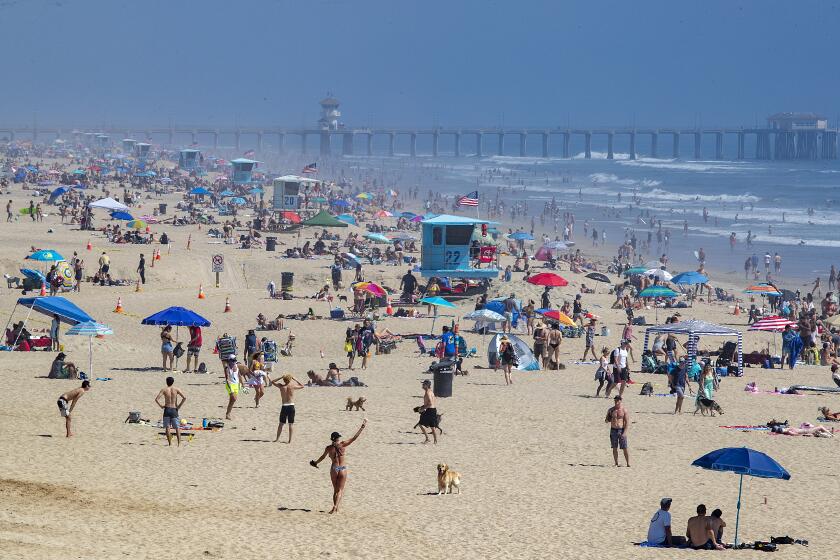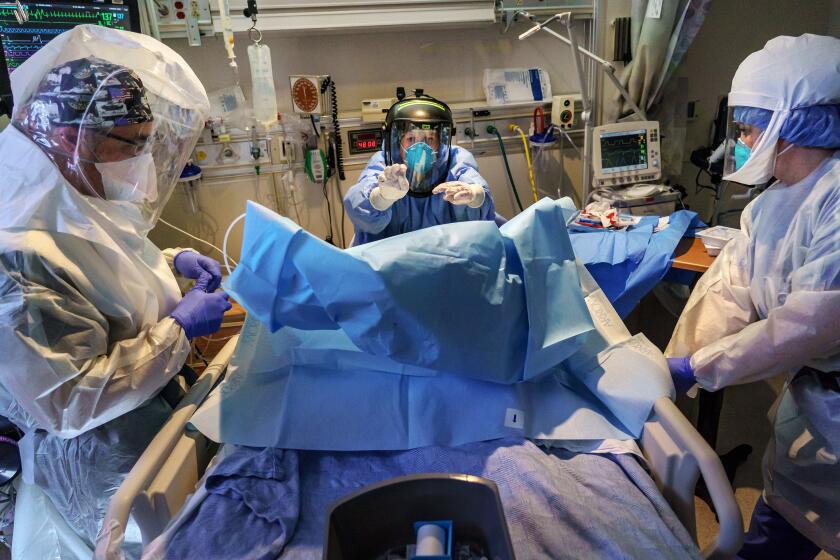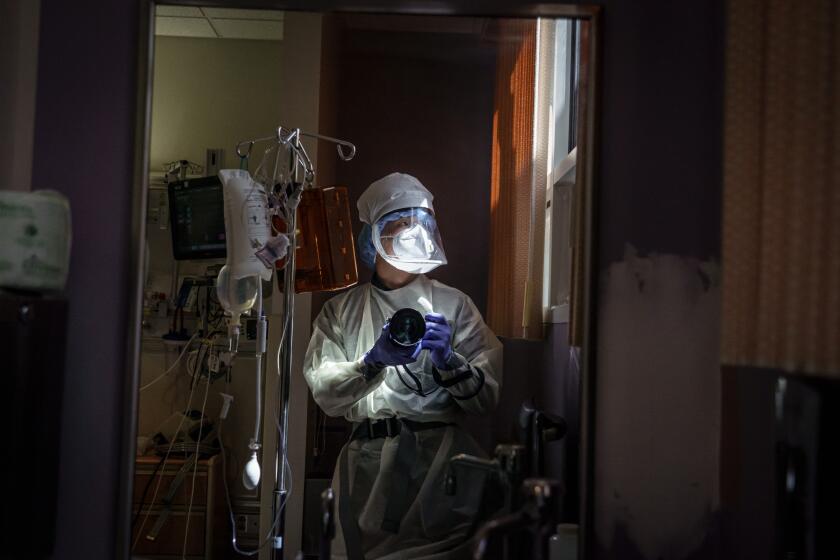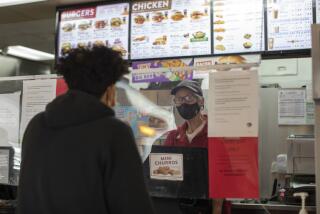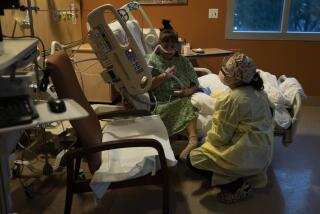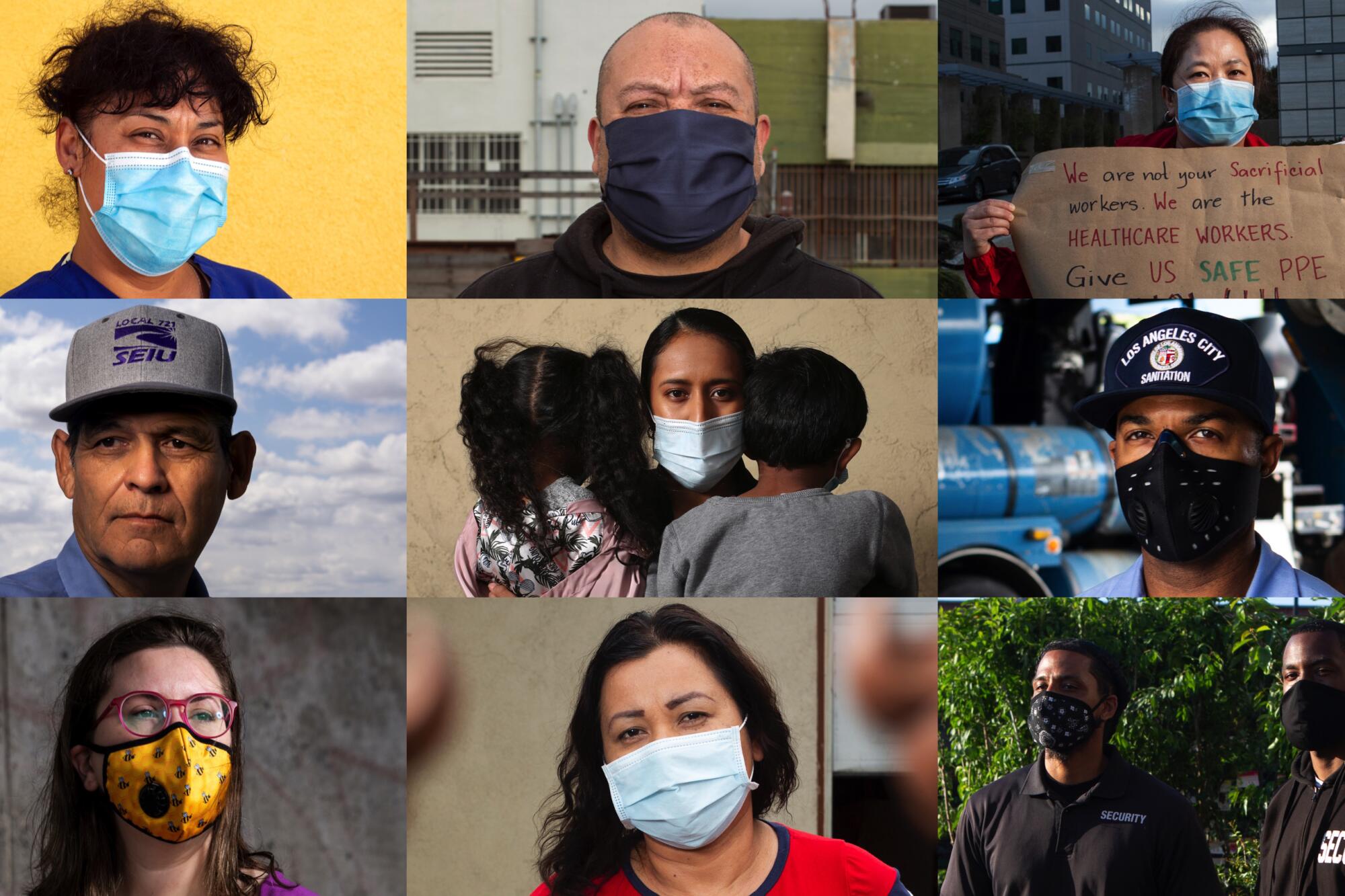
Lines snake through parking lots at grocery stores. Buses carry people to essential jobs. Packages wait outside doorsteps. And doctors and nurses gear up for long shifts in packed hospitals.
While many people work from home and await the end of stay-at-home guidelines, some workers continue to brave the COVID-19 pandemic to go to work to keep essential parts of society running.
“I just want to thank everybody who’s out here working because at the end of the day, people are laying their lives on the line,” said Alonzo Wells, a security guard in Alhambra. “So just thanking everyone. Thank you for taking the time just to talk to us.”
Karla Barrera, deli manager
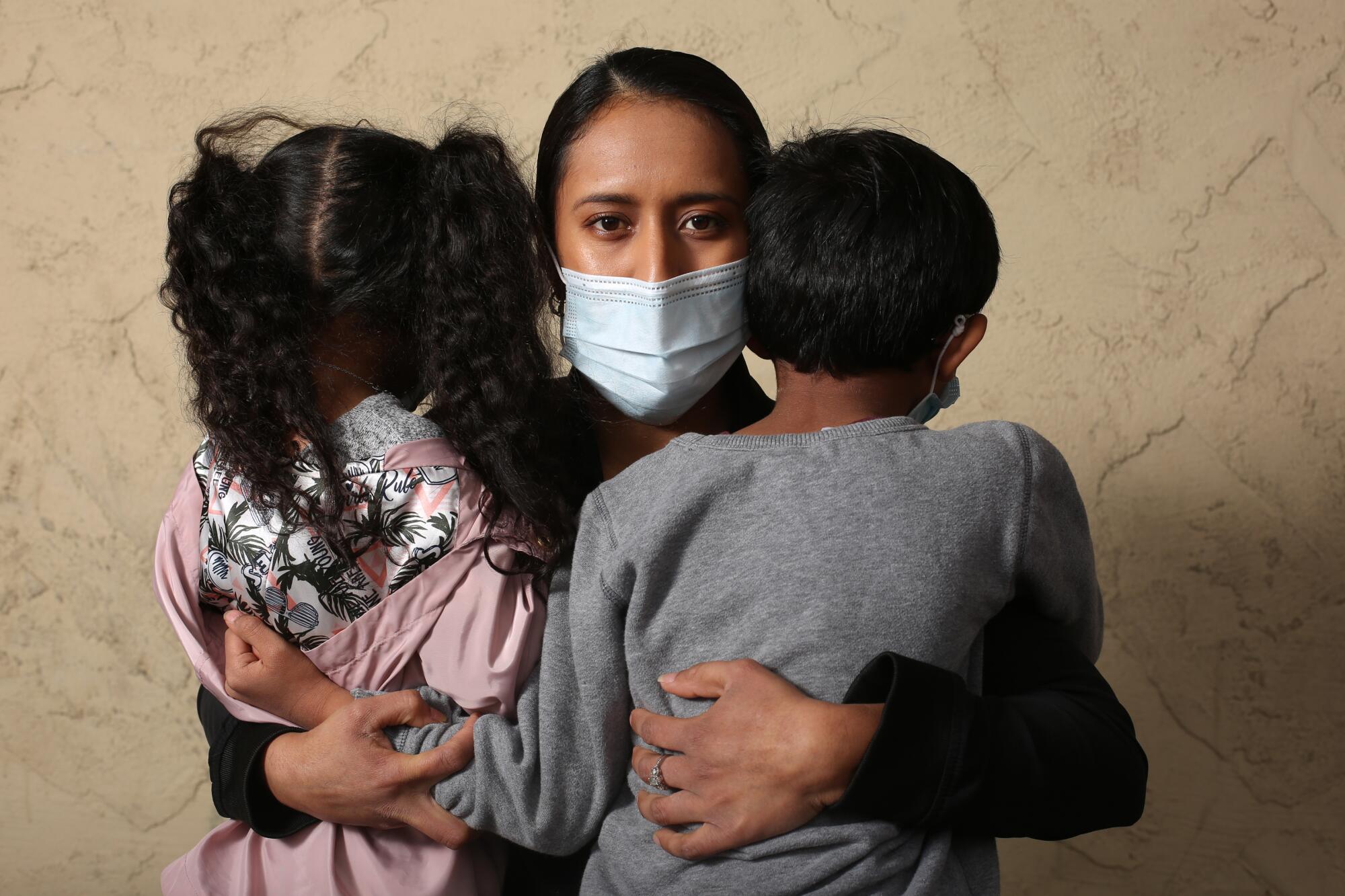
Karla Barrera, 28, is a deli manager at a grocery store in Sun Valley and the mother of two.
She likes her work but has not felt safe since the coronavirus outbreak. She said the company started providing employees with protective masks when it became a city ordinance but still doesn’t provide gloves to all employees. There was some crowd control at first, but then it stopped, and she was told it’s not up to her to control how many customers enter the store.
“If the company preps us and gives us the right equipment, we wouldn’t be so scared.”
She said that one of her co-workers was diagnosed with COVID-19 but that the store stayed open. She is waiting for the results of her COVID-19 test.
“My boss said we all probably already got it. How is it that management can say don’t worry about it, because we all have it? How am I going to feel about that? I’m so scared for my babies. I’m praying that I don’t have it.”
Ruben Rios, maintenance and construction worker
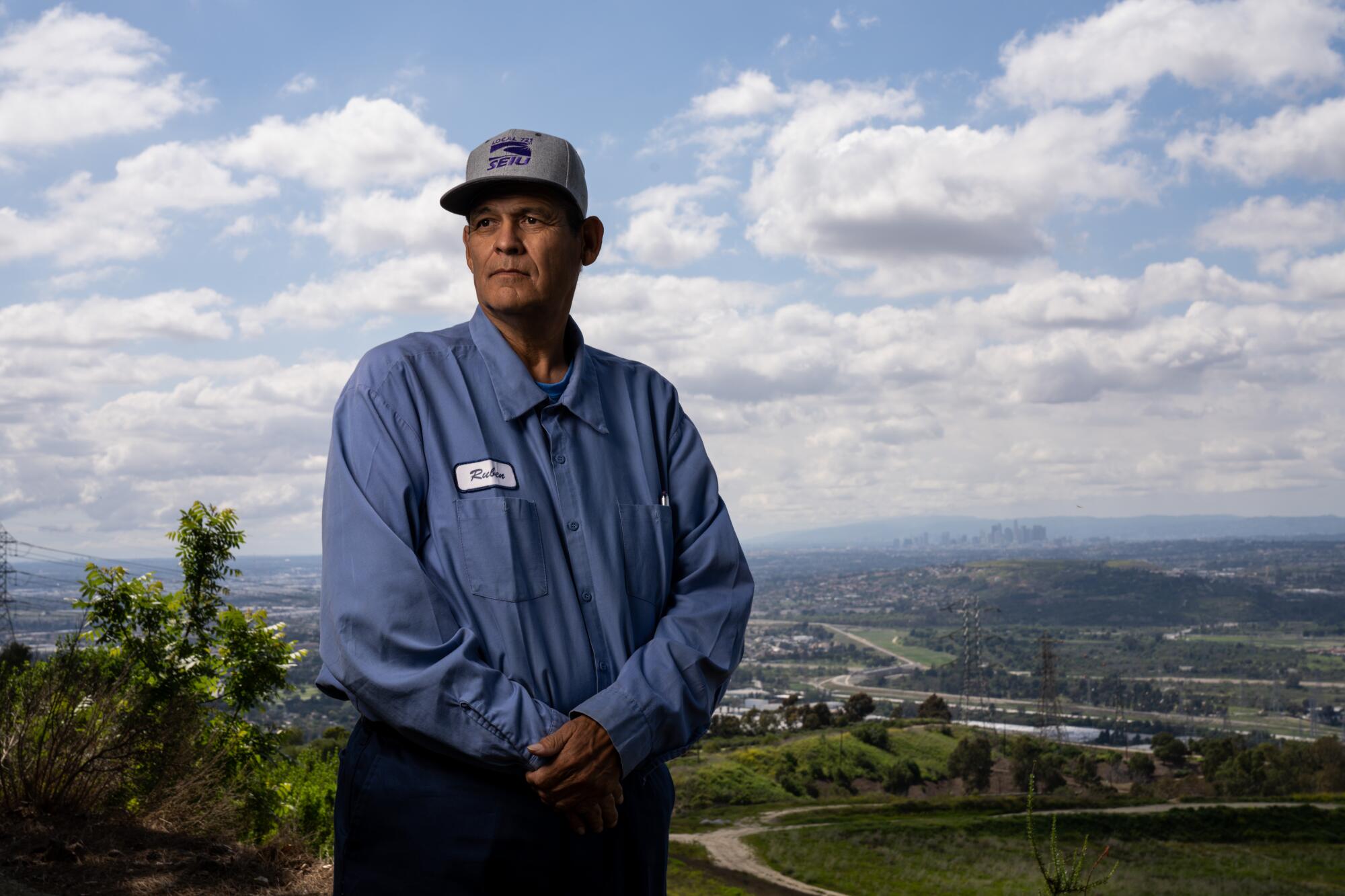
Ruben Rios is a senior maintenance and construction worker at the Puente Hills landfill. He helps maintain the gas system, where the gas is trapped, sent to an energy plant and used to create electricity, servicing some 30,000 homes a day.
At work, social distancing is strictly enforced: Workers do not change in the locker room at the same time, and their schedules, including start times, break times and lunch times, have been staggered. Rios says that his employer has been great during this time. “They’ve been really good at responding to what we need.”
Mary Gay Dacquel, administrative nurse
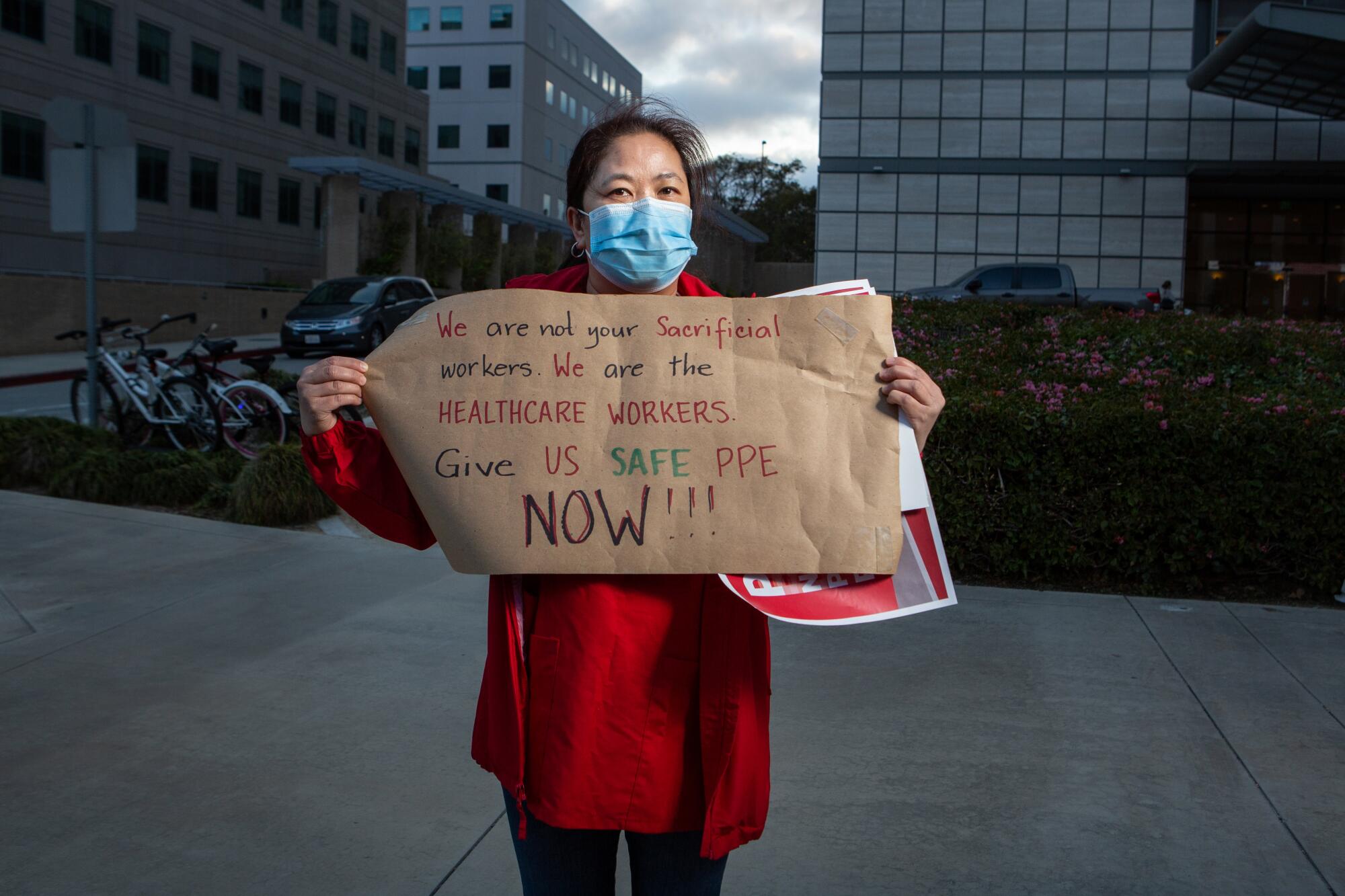
Mary Gay Dacquel, administrative nurse in the medical surgical department at Ronald Reagan UCLA Medical Center, holds a sign that says “Give US Safe PPE Now!!!” Dacquel has worked at the medical center for 21 years. During the COVID-19 pandemic, Daquel is concerned that first responders are being viewed as sacrificial workers and not as valuable healthcare workers. “We need to support our healthcare workers and our essential workers. We need to stay home and save lives.”
Alex Alvarez, Lyft driver
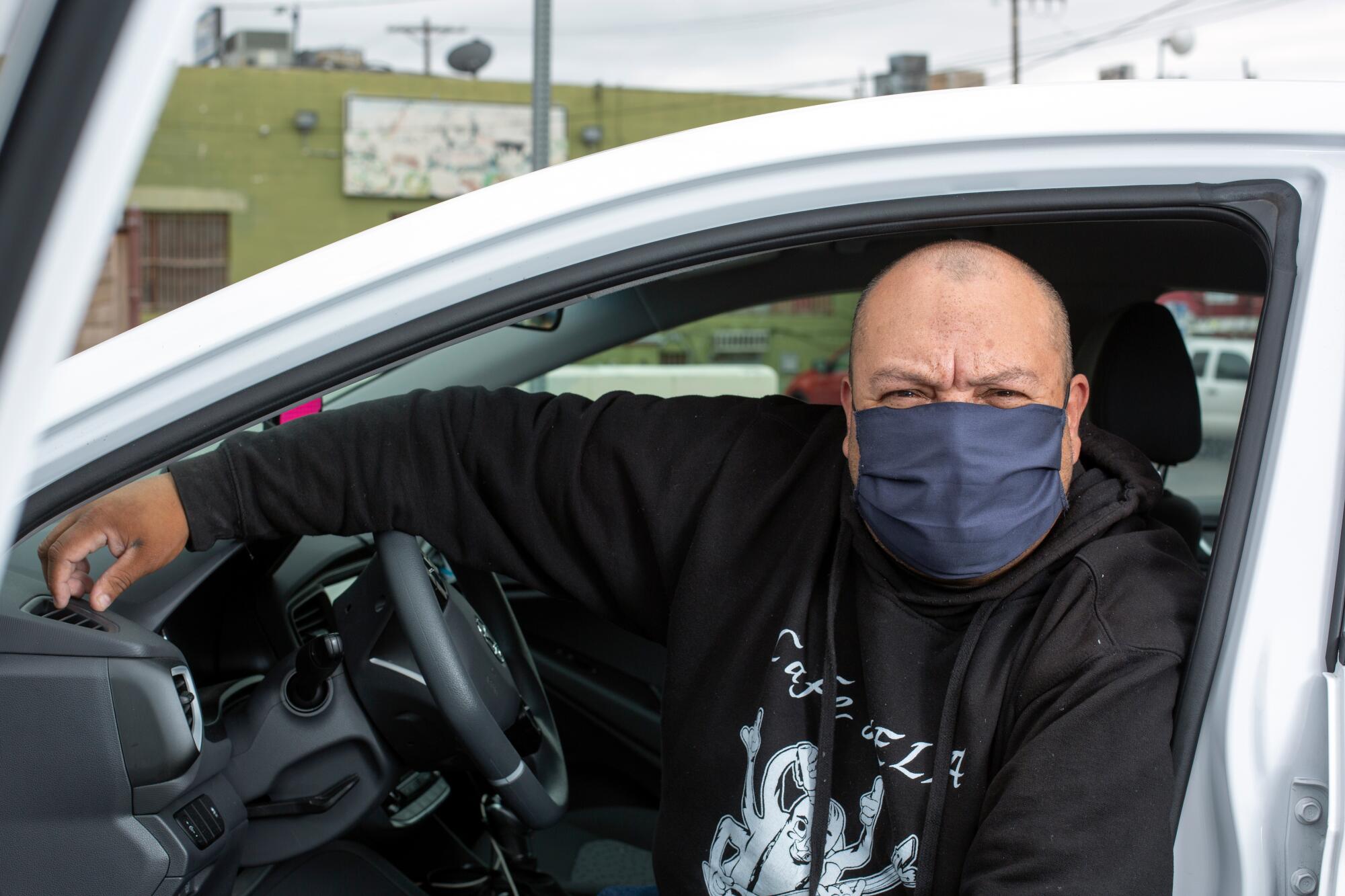
Alex Alvarez, 42, is a driver for Lyft who recently lost his second job as a security guard and booking agent for a local bar in Highland Park. He has a daughter who lives in another city with her mom, but he has not seen her since the coronavirus outbreak because the risk is too high with his work.
He says that he is able to make the same amount of money with Lyft but must work longer hours. He is grateful for a care package that Lyft sent with hand sanitizer, wipes and face masks.
“I live paycheck to paycheck. I don’t have the financial security of some people. I don’t qualify for unemployment. If I don’t pay child support, they could take my license. I’m basically working to pay child support and rent.”
He lives with his mom, who is 72. He hopes that this all blows over and that he can see his daughter by June. “It’s my birthday and then Father’s Day.”
Esbeida Refugio, disinfectant specialist
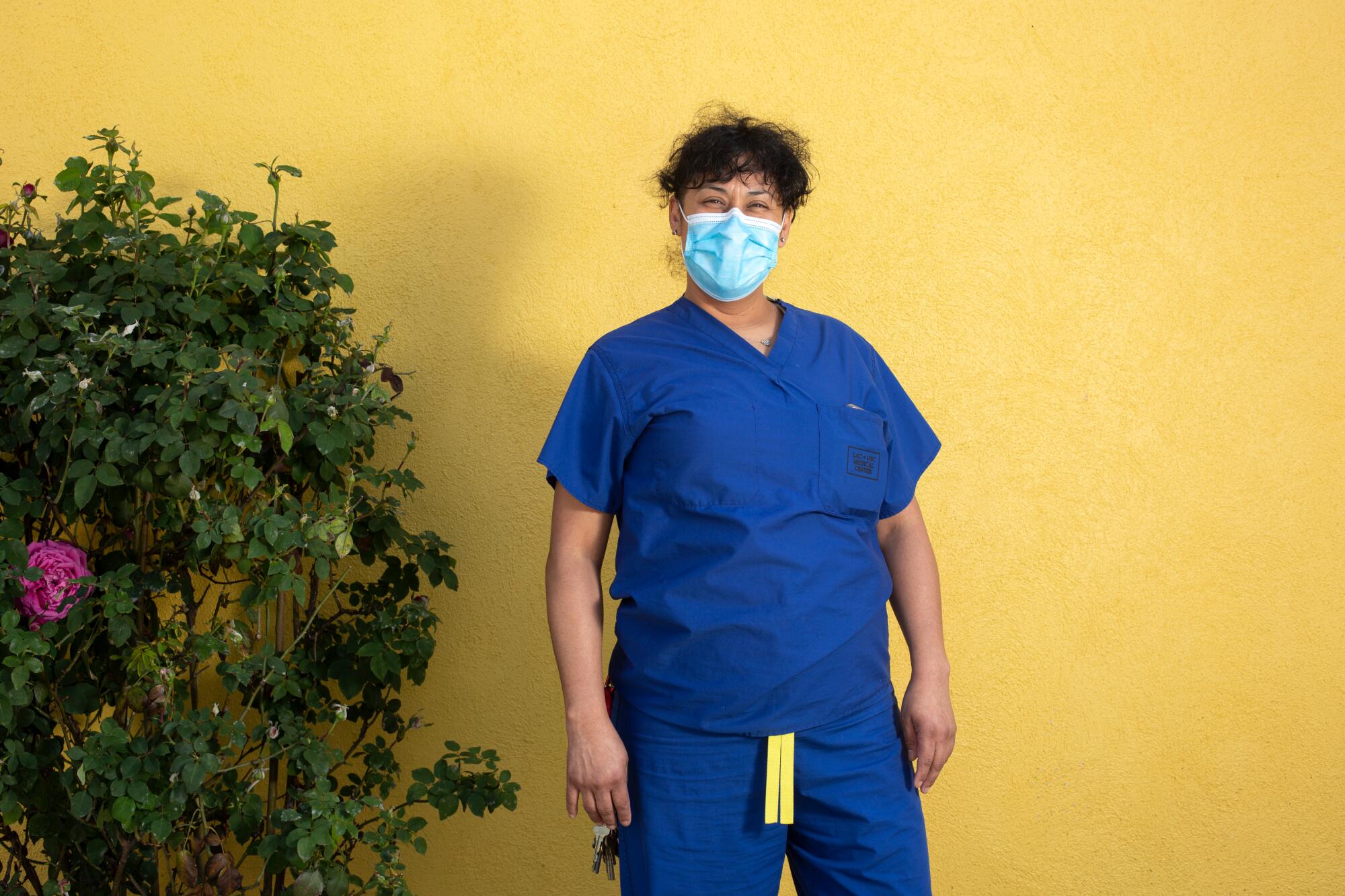
Esbeida Refugio, 39, disinfects hospital rooms at LAC + USC in Boyle Heights. She’s been on the job for eight years and loves what she does. She takes pride in knowing that her work is giving the patient who takes over one of her disinfected rooms the opportunity for a clean slate.
“That’s what I’m here for. I’m trying to avoid other people getting infected with the virus.”
On any given day she cleans up to five rooms that were spaces for COVID-19 patients. Even when the patient is negative for the coronavirus, she still disinfects the room in the same way. She wants everyone who is admitted to go home healthy and be safe.
“I’m here for patient care” but also “to protect the doctors and nurses too.”
They all have families, just like her. She has four children that range in age from 21 to 1, and they are aware of what she does. “I know if I get the virus and have to quarantine, I can depend on my family to take care of the kids.”
She’s found herself cooking more these days because she does not want to go out anymore than she has to. “If I’m exposed at work, I don’t want to be exposed on the street.”
Simboa Wright, wastewater collection worker
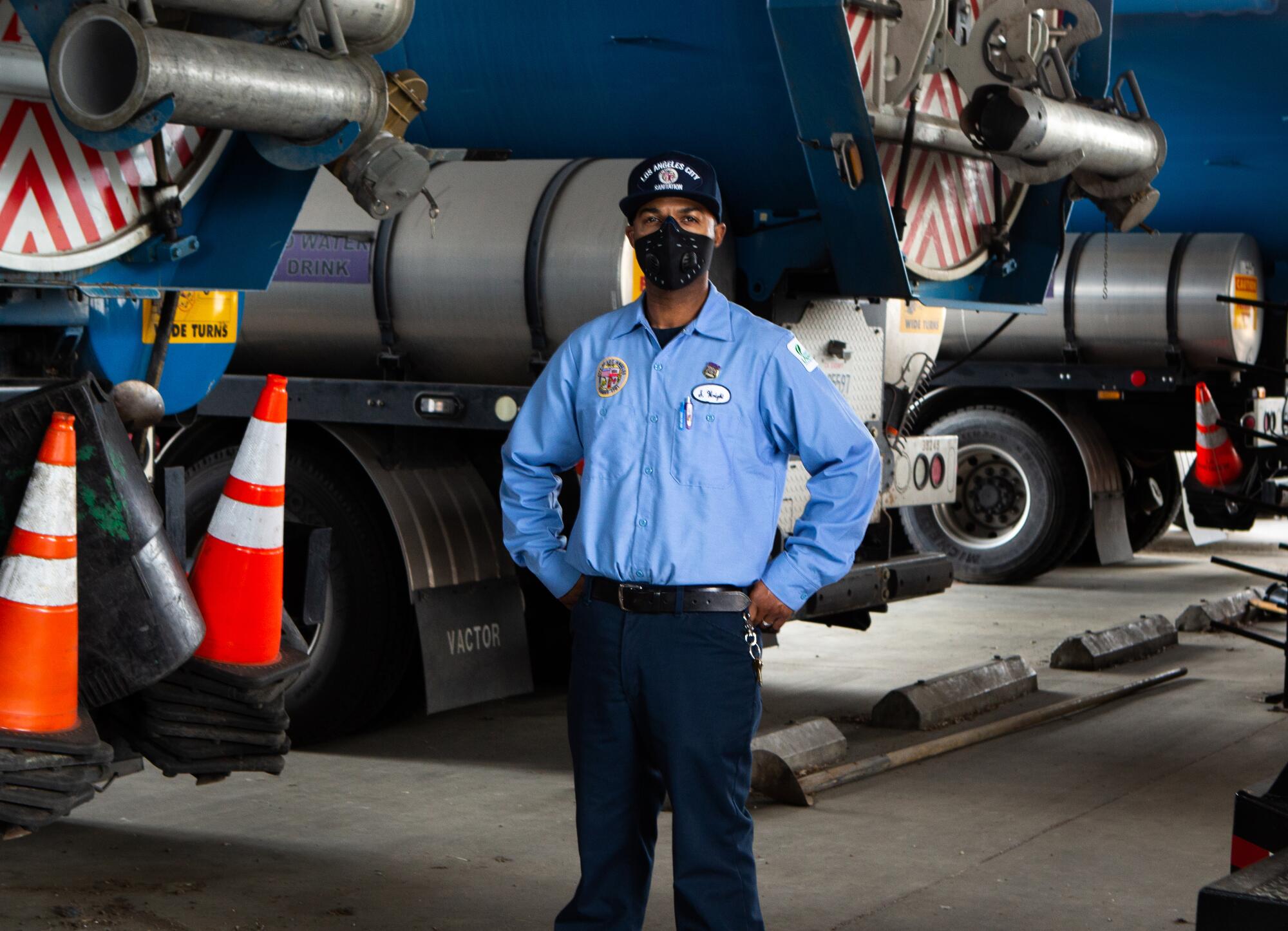
Simboa Wright has been a wastewater collection worker since 2001 with the city of Los Angeles.
“First off, as union members, we are proud to serve Los Angeles and protect the environment. We are fearful, of course, of catching a virus. We are here to maintain 6,700 miles of sewer system. We have the largest municipal sewer system in the nation. And we have a lot of catch basins that we have to maintain also. My wife is a nurse. We’re really concerned with her being on the front line. And also, she does have to deal with patients with the virus, unfortunately. Every day union members are putting ourselves out there on the front line, to not only protect sewers from overflowing and debris going into the ocean, but we are out to continue to maintain the streets. We’re out to continue to maintain the parks. We’re out to continue to maintain all these essential services that many Angelenos take for granted.”
Evelyn Jarillo, cashier
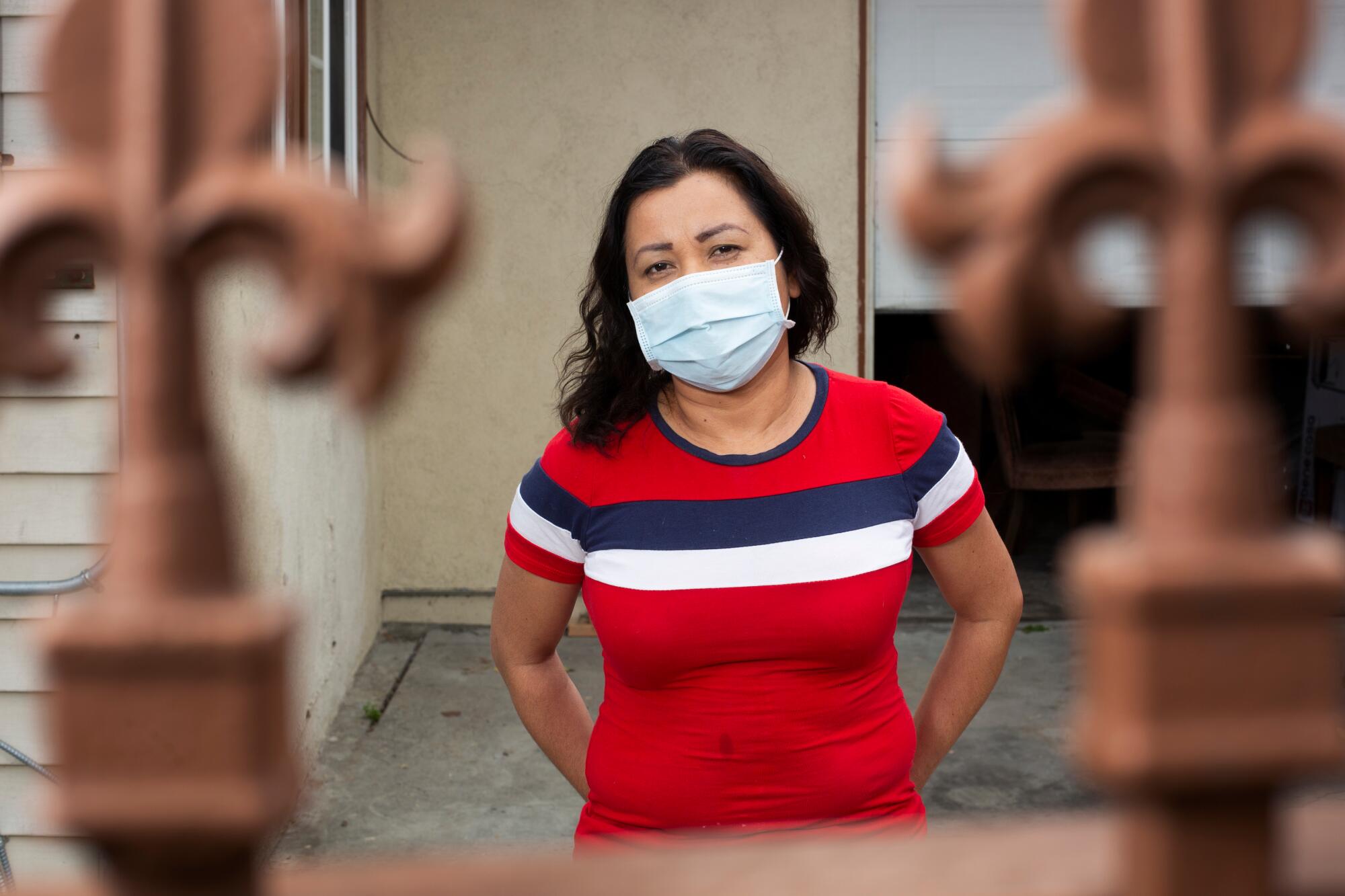
Evelyn Jarillo has worked as a cashier at a grocery store in South L.A. for six years. She tested positive for COVID-19 in early April and has been self-isolating with her husband and daughter ever since. The city sent an e-document for her to sign stating that she would shelter-in-place for two weeks. Her husband has diabetes and works at a pawn shop but also came down with the virus, although her daughter’s test came out negative.
“This isn’t a joke,” she said. Customers should “do what authorities tell [them]. If you need groceries, get what you need for your family. We all have to go through this as a community.”
Deep down, she thinks that people will not truly listen until the pandemic touches their lives. She does not know what can be done to change the social fabric at her store to protect people from spreading the virus but feels that her managers can do more.
Alonzo Wells and Dante Mitchell, security guards
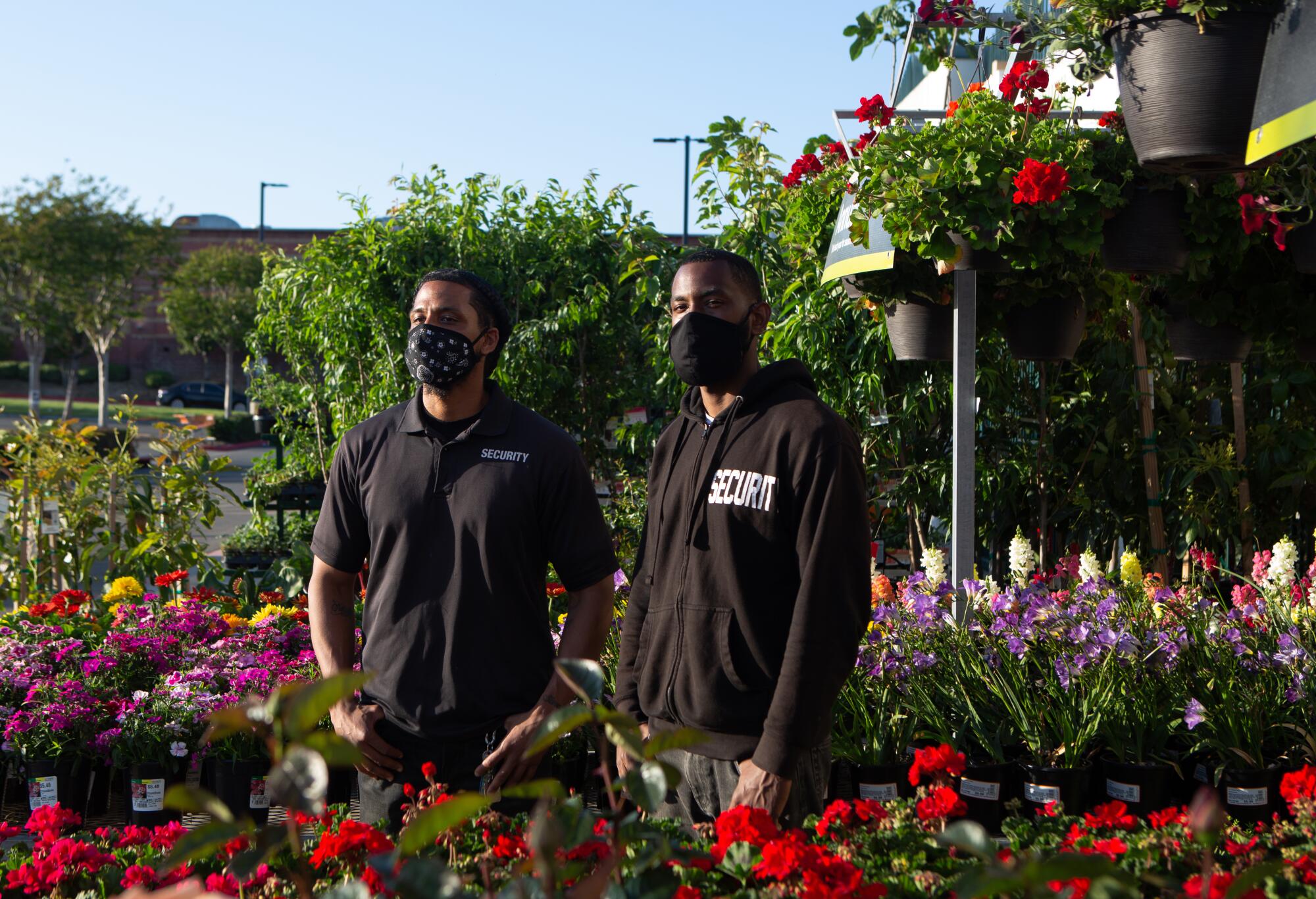
Alonzo Wells, left, and Dante Mitchell are security guards at Home Depot in Alhambra. Before the pandemic, Mitchell worked as a P.E. teacher, coach, writer and performer. Wells was a barber, teacher assistant, poet and writer.
Mitchell said, “We started working here because of the recent events, unfortunately. And since we got here, you can definitely see it’s like half and half — people who you can tell they’re being super supportive and sensitive to other people’s feelings. And then you have people that are fearful, and that fear is making them ostracize other humans. So that’s what I’ve observed so far. The workers here have treated us so good. They’ve been buying us little things, like always giving us drinks, food, telling us that they appreciate us. And we’ve only been here for, what, two and a half weeks now? So we definitely feel appreciated. It’s just our workload, which is kind of heavy, dealing with all these people.”
Wells added: “I definitely have to talk to myself more, give myself that pep talk, to just remember that people are stressed out and they’re fearful. What comes with that comes anger; it becomes a defense. And I just feel like everybody’s trying to protect themselves, to protect their physical well-being and, like mentally, some people are slipping away. ... But then you do see the good. I do see some people coming together and just being kind. I just want to thank everybody who’s out here working because at the end of the day, people are laying their lives on the line. So just thanking everyone. Thank you for taking the time just to talk to us.”
Jazz Hager, delivery driver
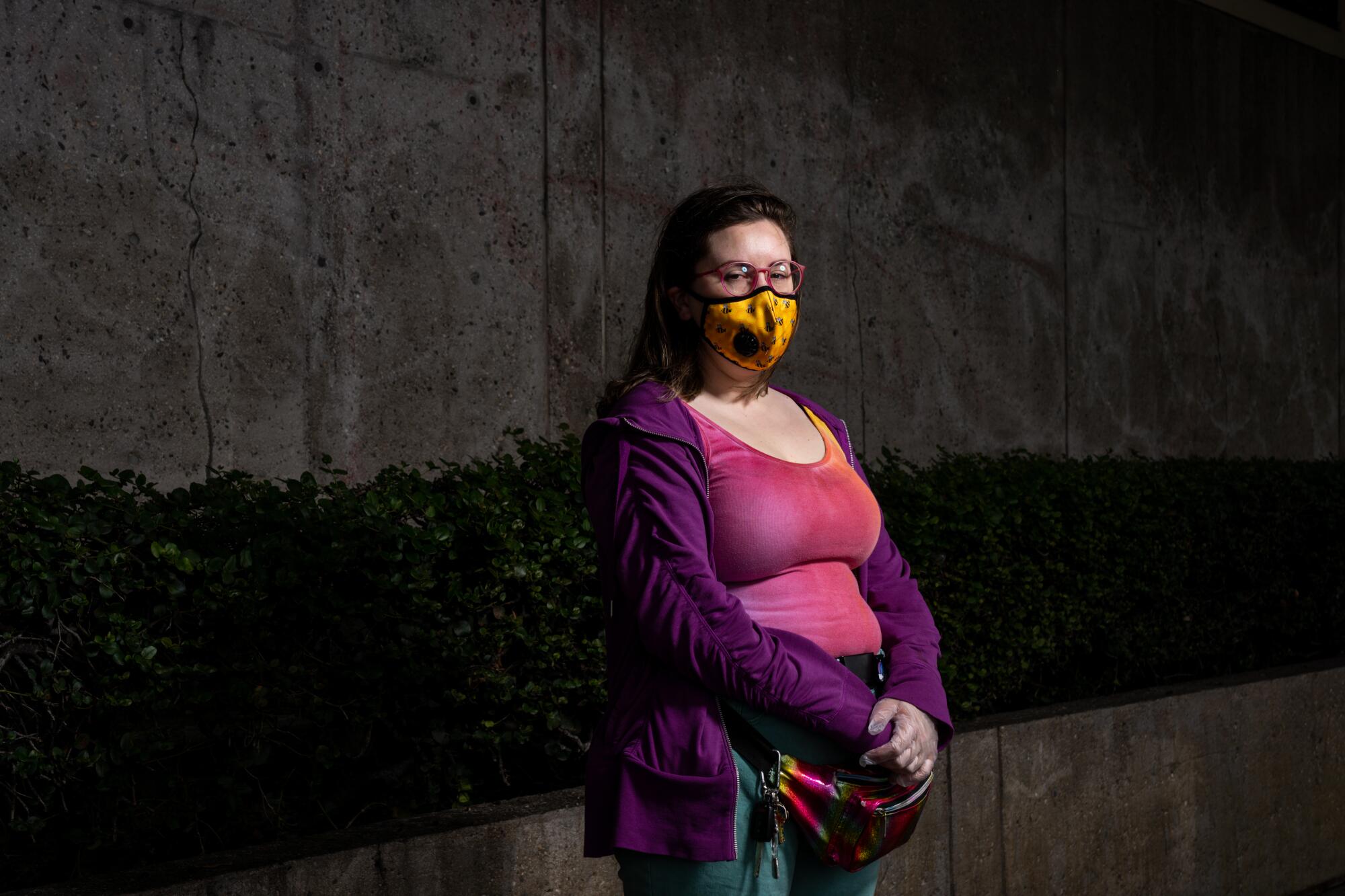
Jazz Hager, 33, of Hollywood, has been a delivery driver for Yummy Foods for almost two years and has been getting more hours due to the Safer at Home orders. The company has provided her with gloves and disinfectant wipes as well as instructions on how to clean the company cars at the start and end of every shift.
Hager said that the job was already physically demanding and that, with the ongoing COVID-19 pandemic, it’s added a lot more mental stress.
“It’s made me think harder about who I interact with, and how I interact with them,” she said. She’s noticed that customers have been generous in tipping when getting their groceries delivered, to the point that her tips have almost doubled.
Los Angeles Times’ visual coverage of the coronavirus crisis
Southern California is having its first big heat wave of the year. Residents are ready to cool off at beaches, but many in L.A. County are closed due to the pandemic. Here are a few scenes from across the Southland.
Photos show increased patient volume at Baja California-adjacent Scripps Mercy Hospital Chula Vista.
Masks, gloves and protective clothing all help protect photographers out on the streets.
Eerie photos and stunning aerial shots show what California looks like under Gov. Newsom’s “stay at home” order.
More to Read
Sign up for Essential California
The most important California stories and recommendations in your inbox every morning.
You may occasionally receive promotional content from the Los Angeles Times.
